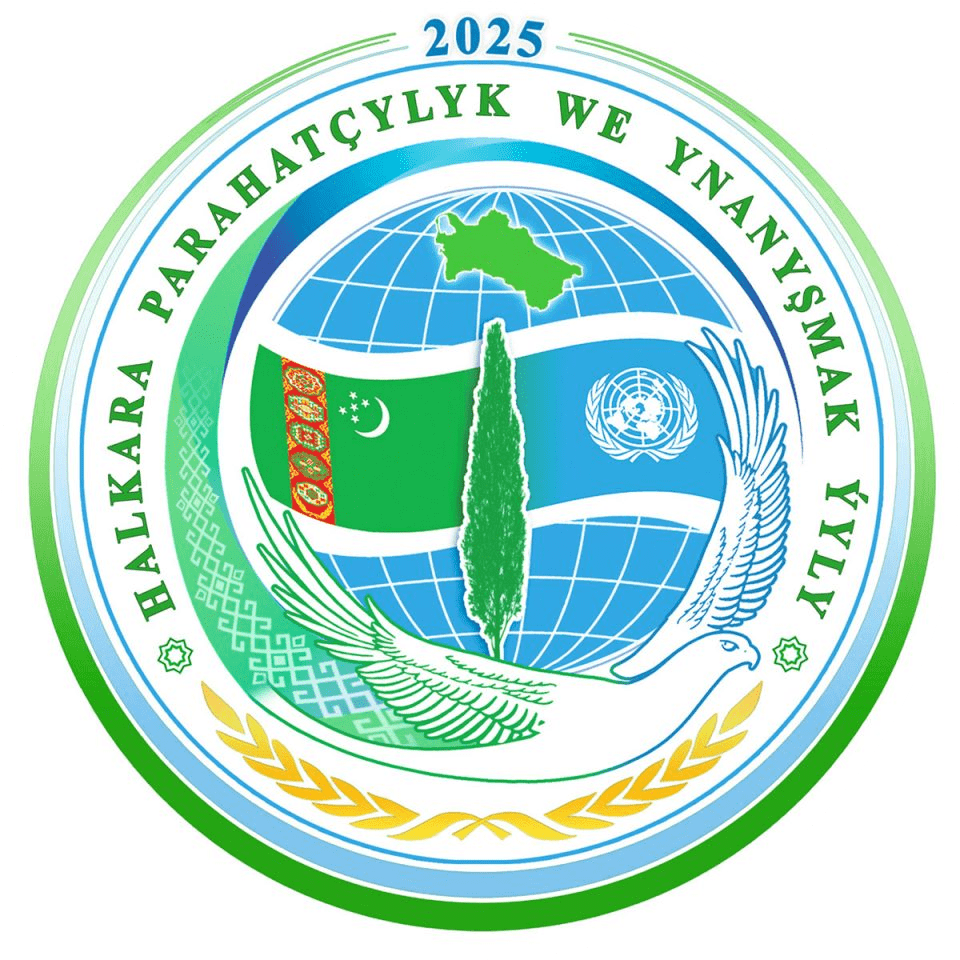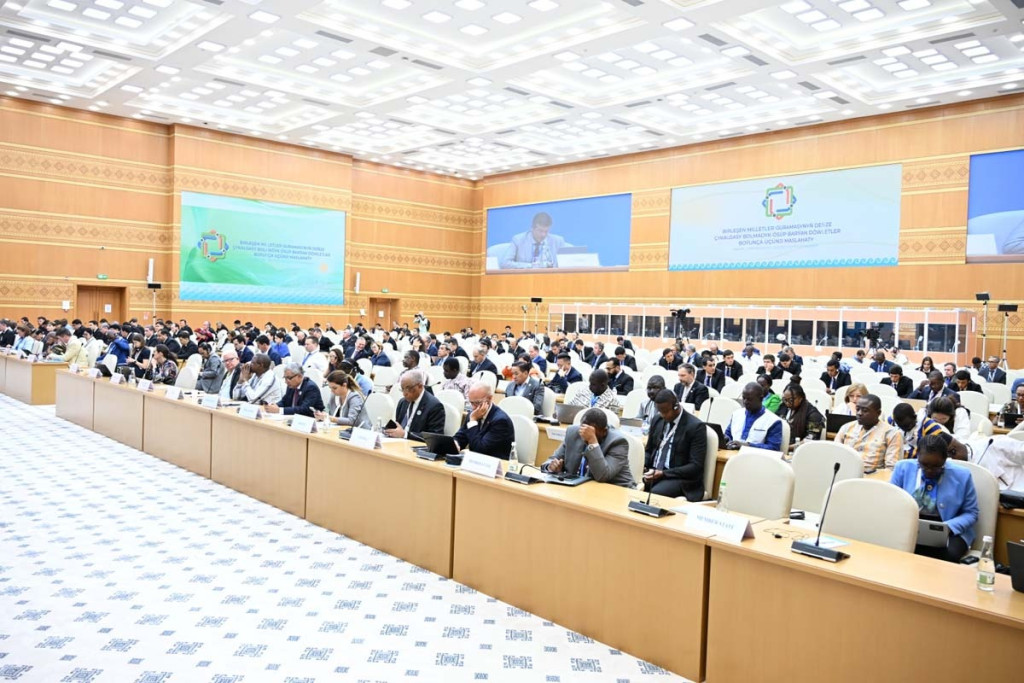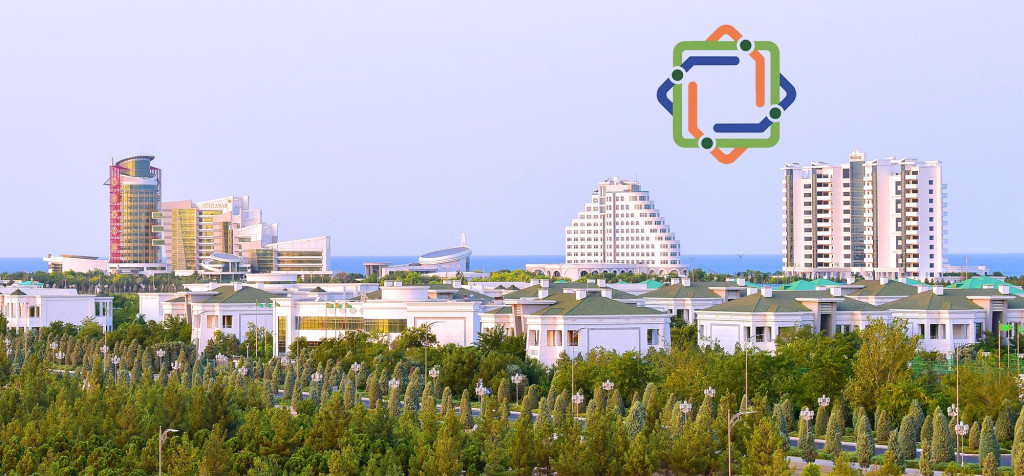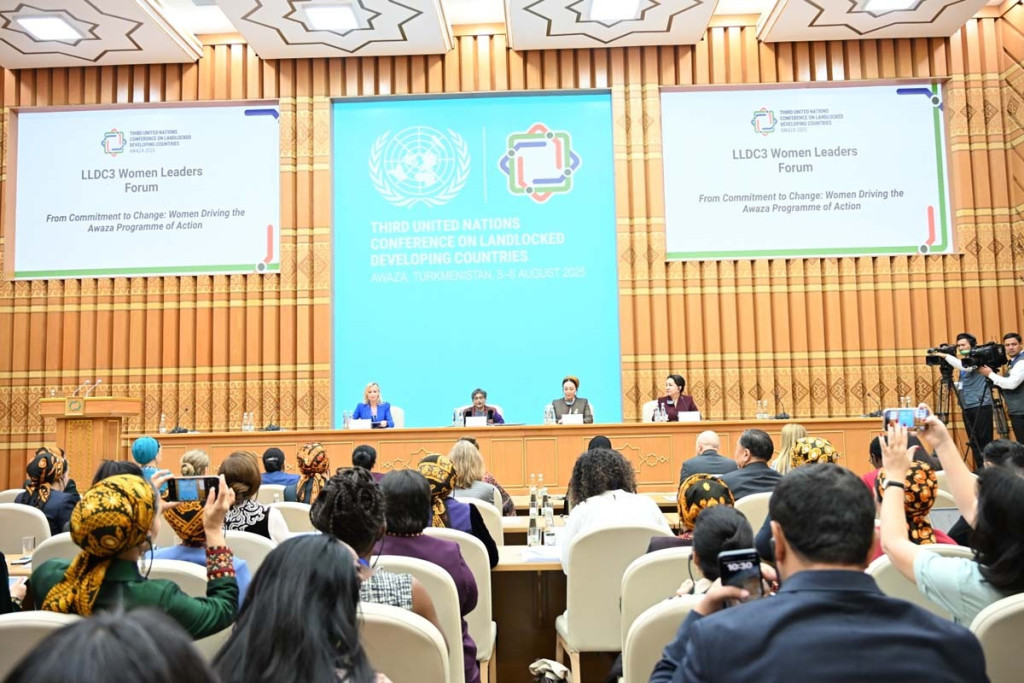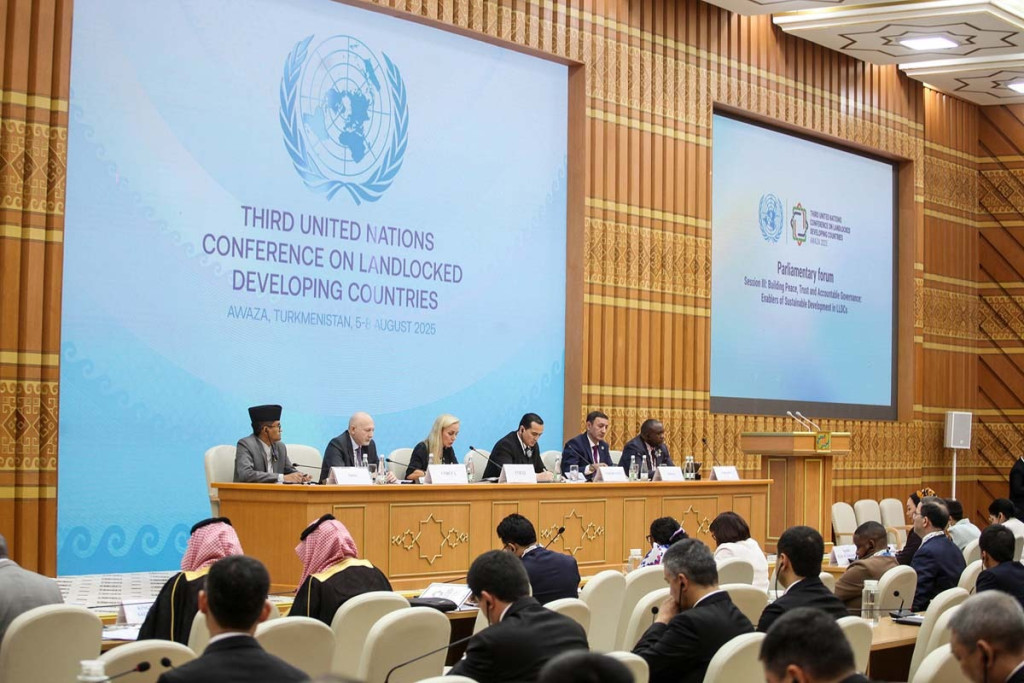
A Parliamentary Forum was held in the Avaza National Tourist Zone as part of the Third UN Conference on Landlocked Developing Countries.
The main objective of this representative meeting is to facilitate the exchange of experience between parliamentarians, and to develop and disseminate recommendations for legislative bodies of landlocked developing countries (LLDCs) on the development of specific measures to include the priorities of the Programme of Action for the Decade in legislative and other activities.
This event will allow sharing practical experience in the implementation of the Vienna Programme of Action, as well as promoting accelerated implementation of the Avaza Programme of Action, including through political activities of parliamentarians at the local, national and regional levels.
The Forum, organized by the Mejlis of Turkmenistan and the Office of the High Representative of the United Nations for the Least Developed Countries, Landlocked Developing Countries and Small Island States in cooperation with the Inter-Parliamentary Union, was attended by heads and representatives of government agencies and parliaments of LLDCs, as well as international organizations.
Having welcomed the participants, the Chairperson of the Mejlis of Turkmenistan noted that the unanimous adoption at the 63rd plenary meeting of the 79th session of the United Nations General Assembly of the Resolution “Additional information on the procedure for holding the Third UN Conference on Landlocked Developing Countries” was evidence of the enormous trust and respect for our country, the legal status of permanent neutrality of which has been recognized three times by the Community of Nations.
As was emphasized, at the suggestion of Turkmenistan, which promotes the principles of peacefulness and neutrality in the world arena, the UN adopted a number of resolutions. Dedicated to issues of peace and security, the role of dialogue and principles of neutrality in achieving trust, energy resources and the creation of transport and transit corridors, these documents significantly strengthened the legal basis for international cooperation in these areas.
In her speech, the head of the national Parliament focused on the state policy in the field of transport. As noted, independent neutral Turkmenistan makes a significant contribution to the activities of the world community in this area, having ratified and acceded to fundamental international documents in this area. These include conventions on transit trade of landlocked states, on cargo lines, on the measurement of ships, on combating illegal acts against the safety of civil aviation. The documents also include multilateral agreements on the creation of international transport and transit corridors, on the establishment of the International Analytical Center for Landlocked Developing Countries, and other treaties and conventions. Thus, the implementation of generally recognized norms of international law in national legislation allows us to accelerate the integration of Turkmenistan into the global legal, political and economic space.
In general, as the head of the Mejlis emphasized, the broad representative composition of the Forum participants in the Avaza National Tourist Zone, as well as the relevance of the issues brought up for discussion, clearly demonstrate the global significance of the approaches and goals initiated by Turkmenistan aimed at strengthening international cooperation in the field of sustainable transport in the interests of peace, development and prosperity.
The floor was then given to the Under-Secretary-General of the United Nations, High Representative for the Least Developed Countries, Landlocked Developing Countries and Small Island States, Secretary-General of the Third United Nations Conference on Landlocked Developing Countries, Ms. Rabab Fatima.
Addressing parliamentarians, the UN Deputy Secretary-General stressed that the adoption of the Avaza Programme of Action for landlocked developing countries marks an important milestone. The Programme sets out a concrete plan to transform the challenges of these countries into a driver of sustainable development and structural reform.
As noted, parliamentarians have constitutional powers to implement universal commitments at the national level through legislation, oversight and budget decisions. The Avaza Action Plan calls on parliaments to oversee the implementation of the document, pass relevant laws and ensure that no one is left behind.
Emphasizing that the Parliamentary Forum is an effective platform for strengthening partnerships and sharing best practices, Ms. Rabab Fatima called on everyone to join efforts for the sustainable development of landlocked countries.
The President of the United Nations General Assembly, Philemon Young, in turn, noted the importance of parliaments in implementing universal commitments at the national level.
It was emphasized that parliaments play a key role in translating the priority areas of the new Action Programme into concrete measures and in their successful implementation.
As noted in the speech, as part of their governance, parliaments create a legal framework that promotes trade, infrastructure, innovation, and the expansion of regional integration and connectivity.
In addition to resolving political and budgetary issues, parliaments serve as a link between the state and citizens.
Parliaments also play a vital role in ensuring the peace and security necessary for sustainable development.
Philemon Young noted that closer cooperation between parliaments would help address the challenges faced by landlocked developing countries and strengthen stability. In this regard, he called on all parliaments to actively participate in the adoption of laws and monitoring their implementation, which would serve as a guarantee for the practical implementation of the commitments of the international community and the General Assembly.
Vice-President of the Executive Committee of the Inter-Parliamentary Union Ms. Sevil Mikailova noted that it was a great honor for her to speak at such an important Forum and expressed gratitude to the Turkmen side for the hospitality provided.
“We have gathered here today to discuss areas for the successful implementation of the Avaza Action Programme,” said S. Mikailova, recalling that the Inter-Parliamentary Union has been working effectively for many years to promote innovation in the field of sustainable development through jointly organized conferences.
Noting that the Avaza Action Agenda includes effective mechanisms to accelerate sustainable and inclusive growth in landlocked developing countries, the Vice-President of the Executive Committee of the Inter-Parliamentary Union stressed that parliaments, as legislative bodies, have an obligation to actively participate in the successful implementation of this Agenda.
The Forum then continued its work in thematic sessions.
At the session devoted to a comprehensive analysis of the transition from the Vienna Programme of Action to the Avaza Programme, the achievements and developments in the implementation of the previous Programme were considered, which will be useful for the new Programme of Action for the decade.
The participants focused their attention on the role of parliamentarians in ensuring the effective implementation of the Avaza Action Programme in terms of their legislative, representative and monitoring functions. As noted, parliaments occupy a key position in raising funds, forming the legislative basis for the policy and monitoring its implementation, which is of great importance in the context of the LLDCs' tasks.
The discussion touched upon the main issues that these countries directly faced in implementing the Vienna Programme of Action. In this regard, successes in strengthening interaction between states and international organizations, as well as in raising awareness of the needs of LLDCs, were noted.
A separate topic of discussion was the new prospects that the Avaza Action Framework opens up for sustainable development, in particular for the expansion of multilateral cooperation, innovative financial mechanisms and accessibility of technologies. As noted, parliamentarians should take a leading position in promoting them through the use of powers that ensure political transparency and accountability.
Particular attention was paid to strengthening parliamentary capacity through interaction with UN structures, development partners and civil society. It was emphasized that such multilateral cooperation facilitates the exchange of experience, advanced training and effective budget policy.
Measures to stimulate investment in infrastructure, public services and climate-smart development were also discussed. Parliamentarians noted the need to ensure accountability in the implementation of such projects to ensure sustainable and inclusive development.
The panel session on “Building and Strengthening a Multilateral Trading System Responsive to Landlocked Developing Countries” looked at the role of parliaments in implementing World Trade Organization (WTO) regulations. Although these regulations are binding on all member states, they only enter into force after ratification and implementation at the national level.
In the speeches of experts and parliamentarians, international trade was identified as the main factor of economic well-being and inclusive development of LLDCs. In this regard, the need for active participation of parliaments in establishing multilateral trade cooperation was emphasized, and emphasis was placed on mechanisms of parliamentary control over trade agreements.
One of the topics of discussion was the opportunities associated with the growth of digital trade, which has led to significant changes in the world over the past decades and created new conditions for cross-border trade. Participants noted that LLDCs face certain challenges in the digital economy that require the adoption of an appropriate legislative framework.
The parliamentarians also discussed practical steps to strengthen the positions of these countries in the global trading system against the backdrop of current changes in trade policy in the global economy. In this regard, the importance of legislative measures aimed at ensuring free trade was noted.
The challenges facing parliaments in developing digital trade and the digital economy in LLDCs, as well as in enhancing the effectiveness of the application of multilateral trade agreements, were considered. Particular attention was paid to the need to coordinate efforts with international organizations - the World Trade Organization and the United Nations Conference on Trade and Development (UNCTAD), as well as with development partners and civil society to ensure sustainable development and empowerment of parliament.
Thus, the session became a constructive platform for developing recommendations for strengthening the multilateral trading system and enhancing the role of parliaments, for exchanging experiences in the context of ensuring sustainable economic development of LLDCs.
The role of effective and inclusive governance in strengthening social cohesion during the International Year of Peace and Trust, as well as in the implementation of the Avaza Programme of Action and the 2030 Agenda for Sustainable Development was discussed at the session “Strengthening Peace, Trust and Responsible Governance: Factors for Sustainable Development in Landlocked Developing Countries”.
The discussion emphasized the importance of broadly involving women and youth in the decision-making process, which will enhance the effectiveness of governance mechanisms. Forum participants also noted the need for institutional reforms to expand the capacity of parliament, increase inclusiveness, and strengthen trust and stability in society.
At the same time, practical developments and strategies for the development of parliamentary diplomacy and dialogue as tools for strengthening interaction between LLDCs and their neighboring states were considered. As emphasized, inclusive and responsible governance not only promotes harmony and trust within a single country, but also helps strengthen international relations, creating the preconditions for sustainable development.
An exchange of views also took place on the role of parliaments in promoting political dialogue and social unity, which are necessary conditions for the implementation of national and international programs. Particular attention was paid to the creation of mechanisms that ensure the participation of representatives of all segments of the population in legislative activity and the consideration of their interests.
In addition, the importance of cooperation instruments for maintaining institutional sustainability and improving governance in LLDCs was emphasized. In this regard, the need for coordination of efforts by international organizations and civil society to strengthen parliamentary institutions and create conditions for sustainable and inclusive development was noted.
At the final session of the Forum, the main ideas and recommendations were systematized, which will allow us to identify priority tasks for strengthening the role of parliamentarians in the implementation of the Avaza Action Programme.
The Parliamentary Address to the Third UN Conference on Landlocked Developing Countries was submitted to the participants for consideration, which sets out the call of LLDC parliamentarians for technical and financial support to carry out their functions. This includes, in particular, the provision of institutional recommendations and instructions from relevant international organizations, as well as assistance in mobilizing resources to build existing capacity.
Then the floor was given to the Chairperson of the Senate of the Oliy Majlis of the Republic of Uzbekistan, Ms. Tanzila Narbaeva, who warmly welcomed all those gathered and expressed her sincere gratitude to President Serdar Berdimuhamedov and the United Nations for the invitation to take part in such an important event.
Warmly congratulating the organizers on the successful holding of the current Forum, the Speaker of the Parliament of the friendly country emphasized that holding such an authoritative international Conference dedicated to current issues on the global agenda indicates that Turkmenistan has become an important platform for international dialogue.
In her speech, Tanzila Narbaeva also noted the importance of the regional Inter-Parliamentary Forum, created in 2023 at the initiative of the heads of state of Central Asia and which is an important platform for strengthening interstate cooperation.
This Forum successfully held its second meeting and established itself as an effective mechanism for promoting integration, sustainable development, including the development of transport infrastructure.
In conclusion, the Chairperson of the National Parliament of the Republic of Uzbekistan wished success to all those gathered.
Summing up the Forum, the UN Under-Secretary-General, High Representative for the Least Developed Countries, Landlocked Developing Countries and Small Island States, Secretary-General of the Third UN Conference on Landlocked Developing Countries, Ms. Rabab Fatima thanked everyone for their commitment to advancing the priorities of landlocked developing countries.
As noted, the Forum discussed concrete measures to increase women’s representation in parliaments in landlocked developing countries and to establish formal mechanisms for regular interaction with youth, civil society and the private sector. Such inclusive processes enhance policy effectiveness.
Ms. Rabab Fatima congratulated everyone on the successful conduct of the Forum, noting with satisfaction that today's discussions clearly demonstrated the important role of parliaments in the upcoming implementation of the Avaza Action Framework.
At the end of the Parliamentary Forum, its participants emphasized the importance of further joint efforts to strengthen the role of parliamentarians in implementing national and international development programs. According to the unanimous opinion of the delegates, the current event has become an important platform for multilateral dialogue designed to enhance the effectiveness of legislative bodies in promoting peace, trust and sustainable development.
Having expressed gratitude to the Turkmen side for the high level of organization of the Forum, the parliamentarians expressed confidence that the practical implementation of the proposals and recommendations put forward during it will contribute to strengthening the role of parliamentary institutions in the international arena and increasing the significance of their contribution to achieving the Sustainable Development Goals.
